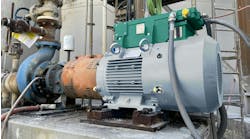Researchers at Sheffield Forgemasters International Ltd. have succeeded in casting a 160-metric ton, hollow steel ingot — an achievement that may lead to more efficient methods of producing forged cylinders.
SFIL is one of the world’s largest producers of forgings for nuclear power projects. The company once cast hollow ingots at its foundry in Sheffield, England, but that program was discontinued several decades ago.
The prototype castings were the result of more than a year of investment and research at the engineering group’s R&D center in Sheffield. “Establishing the correct parameters for a casting of this kind are highly complex and require processes such as finite-element analysis and casting solidification modeling to achieve tangible results,” explained SFIL’s research chief Jesus Talamantes-Silva. “However, our efforts in preparatory research mean that many of the potential failings when committing to an entirely new production process are reduced and addressed before we start costly processes, such as casting and pouring steel for the actual component.”
Forged cylinders are used to produce transition cones used in nuclear-power steam generators, as well as waste casks for spent nuclear fuel rods. The cylinders can be produced from solid ingots, but the process is more time- and energy-intensive than working from a hollow casting.
Commenting on the new development, Talamantes-Silva said: “This process is an exciting development for Forgemasters and aims to reduce many of the costs and processes involved in manufacturing some of the critical forgings required by the power-generation industry.”
He emphasized that the new casting process is being developed further and is not fully tested. He indicated the finished hollow ingots must be subjected to destructive testing to establish the ingots’ material qualities and structural characteristics.
However, Talamantes-Silva confirmed “the results so far are extremely promising, with the first ingot now cast and stripped from the mold.”










